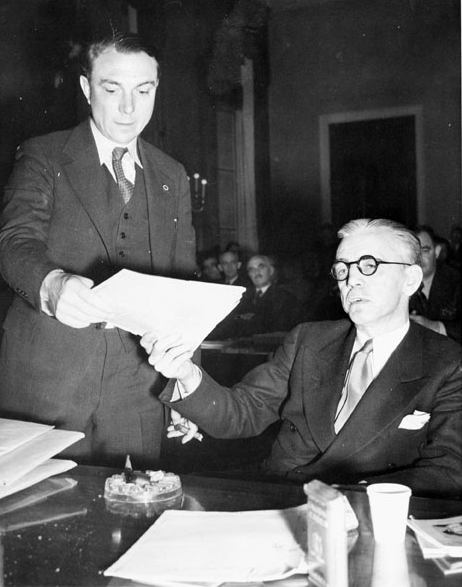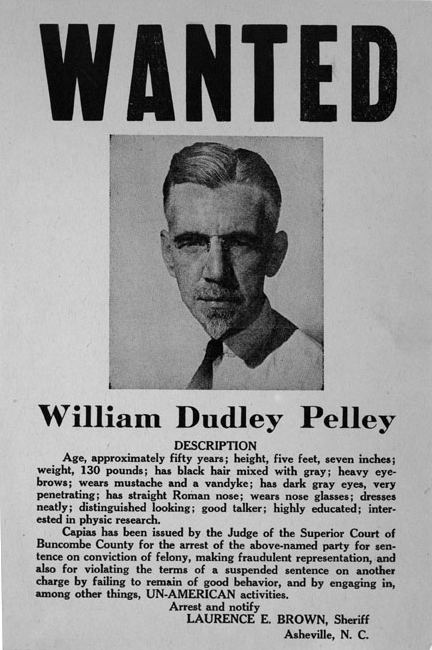William Dudley Pelley arrived to Asheville in 1930. He began his stint in the area by establishing the short-lived Galahad College. Soon thereafter he launched the magazine Liberation. By 1933, Pelley had created the Silver Legion of America — an anti-Semitic, pro-Hitler organization.
As Jon Elliston reported in a Mountain Xpress article (“New Age Nazi,” Jan. 28, 2004):
“In the pages of Liberation and Pelley’s Silvershirt Weekly, [Pelley] trumpeted his plan for addressing ‘the Jewish problem’ — a plan that bore no small resemblance to Hitler’s. The Silver Shirts, Pelley pledged, would spearhead a new ‘Christian Commonwealth’ in the United States, which would register all Jews in a national census, then systematically reduce their role in business, government and cultural affairs, ultimately confining all Jews within one city in each state.”
In 1935, Pelley was convicted of fraud in Buncombe County. His punishment: a fine and a suspended prison sentence on account of good behavior.
When the U.S. entered into the Second World War, however, Pelley’s business activities and publications fell under scrutiny of the FBI. It would result in his 1942 arrest for sedition. By that time, Pelley had relocated to Noblesville, Ind.

Photo courtesy of North Carolina Collection, Pack Memorial Public Library, Asheville, North Carolina
Congressional records, available in The North Carolina Room, include remarks made by Congressman Jerry Voorhis (Calif.) on Sept. 3, 1942:
“It seems to me proper and of some importance to record briefly the work of the Committee on Un-American Activities in the Pelley case. The best key to Pelley’s general attitude and to his purposes has recently been properly emphasized in the press. It consists of a paragraph in one of his many books, [The] Door to Revelation, in which he tells of sitting with a companion on the evening that the news came of Hitler’s seizing power in Germany and of how upon receiving this news he arose and remarked to his companion, “Tomorrow we have the Silver Shirts.” Pelley then proceeded to organize the Silver Shirts, or the Silver Legion of America, along such lines and with such aims as to leave little doubt that its central purpose was to seize power in the United States and organize this country as a totalitarian state with William Dudley Pelley as its head.”
Near the end of his statement, Voorhis noted one of the great struggles in prosecuting Pelley was both his popularity and manipulation:
“The Pelley case has been particularly difficult because of [Pelley’s] nation-wide prominence, widespread activities, his cleverness, and the considerable following that he succeeded in building up by appeals to prejudice and even to religion. Such followers have always included persons of wealth who stood ready to rush in and make bond for Pelley or finance his activities. As will be seen from this account he has been in court a very considerable portion of his time and has carried his appeals to the highest court possible in every case — but has never lacked necessary funds for the purpose. That the investigations launched by the committee and carried on at considerable expenses have been fully justified is, of course, apparent. I am informed that the committee has spent more money on the investigation and subsequently assisting in the prosecution of Pelley than on any other single individual Nazi, Fascist, or Communist which it has investigated.”
In August of 1942, Pelley was sentenced to 15 years. He was paroled in 1950. He died June 30, 1965, in Noblesville, Ind.
As Elliston reported, Pelley’s decade in Asheville was spent crafting and spreading his propaganda through a number of publications. These ventures, however, did not always translate to financial success. Elliston wrote:
“For all Pelley’s energy, vision and skill as a propagandist, however, he proved to be an abysmal businessman. With each new political or spiritual whim, it seemed, Pelley founded another enterprise, never pausing to solidify any of them. In the course of a mere 10 years, he incorporated Galahad College, the Galahad Press, the Fellowship Press, the Foundation for Christian Economics, the League for the Liberation, Pelley Publishers and the Silver Shirts, and founded five publications: Liberation, Pelley’s Silvershirt Weekly, The New Liberator, The Galilean and Roll-Call.”




Before you comment
The comments section is here to provide a platform for civil dialogue on the issues we face together as a local community. Xpress is committed to offering this platform for all voices, but when the tone of the discussion gets nasty or strays off topic, we believe many people choose not to participate. Xpress editors are determined to moderate comments to ensure a constructive interchange is maintained. All comments judged not to be in keeping with the spirit of civil discourse will be removed and repeat violators will be banned. See here for our terms of service. Thank you for being part of this effort to promote respectful discussion.